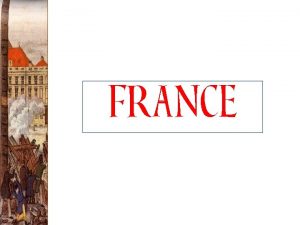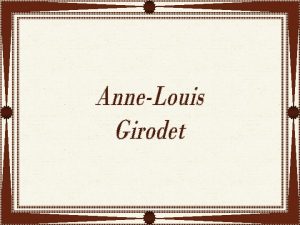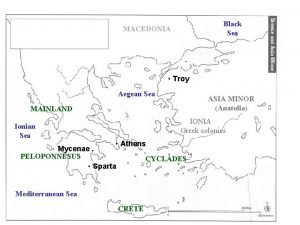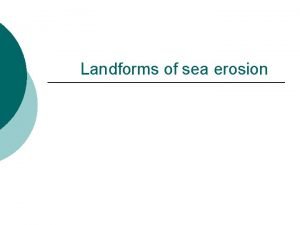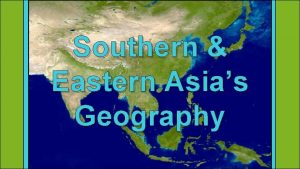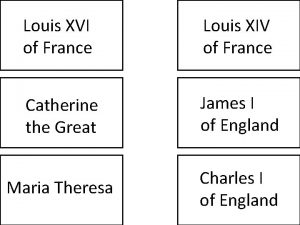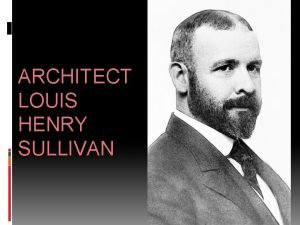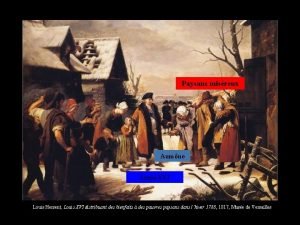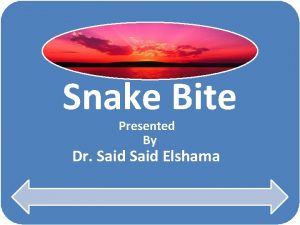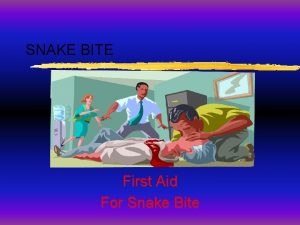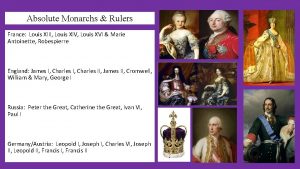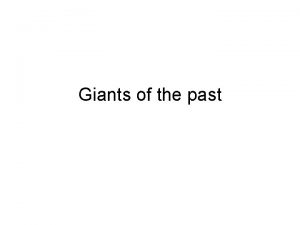FRANCE FRANCE The Giant Sea Snake Louis Philippe



















![The New Austrian Emperor Franz Joseph I [r. 1848 -1916] The New Austrian Emperor Franz Joseph I [r. 1848 -1916]](https://slidetodoc.com/presentation_image/e67816d9de87b46a1588834ba10c9a9c/image-20.jpg)






















- Slides: 42

FRANCE

FRANCE: The Giant Sea Snake?

Louis Philippe, “The Pear, ” 1848

Prince Louis: Not Too Steady! Victor Hugo & Miguel de Girardin try to raise Prince Louis upon a shield. [Honoré Damier’s lithograph published in. Charavari, December 11, 1848].

The February Revolution G Working class & liberals unhappy with King Louis Philippe, esp. with his minister, Francois Guizot [who opposed electoral reform]. G Reform Banquets used to protest against the King. Paris Banquet banned. Troops open fire on peaceful protestors. Barricades erected; looting. National Guard [politically disenfranchised] defects to the radicals. § King Louis Philippe loses control of Paris and abdicates on February 24. § §

Alphonse Lamartine G A poet & liberal, he believed in the “Rights of Man. ” § To vote, to free speech, to property, & to a secular education. G Declared a new Provisional Government. § Conservatives & liberals are suspicious of republicanism • Reminiscent of the Reign of Terror.

Louis Blanc G A Social Democrat. G He believed in the “Right to Work. ” § National Workshops. • Provide work for the unemployed. G Financial Crisis § Flight of capital. § Stock market crashes [55% decline]. § New 45% increase of taxes on the peasants.

The Coalition Splits: Mar. -May G The conflicts between liberals & socialists over: § The timing of elections to the Constituent Assembly. § The costs of government social programs. • Did they violate laissez-faire? § The question of whether you could have liberty for all men and still have a system based on private property. G Growing social tensions between the working class & the bourgeois middle class regarding: § The nature of work. § The right to unionize. § Pay levels.

April Elections G Resulted in a conservative majority in the National Assembly. § They began debating the fate of social programs [like the National Workshops]. G The conservative majority wanted the removal of radicals like Blanc from the government. § In early June, the National Workshops were shut down. • This heightened class tensions!

The “June Days” G Worker groups in Paris rose up in insurrection. § They said that the government had betrayed the revolution. • Workers wanted a redistribution of wealth. § Barricades in the streets. • Victor Hugo’s Les Miserables was based on this event. G A new liberal-conservative coalition formed to oppose this lower class radicalism.

Paris: To the Barricades Again!

The 2 nd French Republic (1848 -1852) G General Louis Cavaignac assumed dictatorial powers & crushed the revolt. § 10, 000 dead. § A victory for conservatives. The Republic by Jean-Leon Gerome G Nov. , 1848 a new constitution provided for: § An elected President. § A one-house legislature.

President Louis Napoleon G The December election: § The “law and order” candidate, Louis Napoleon Bonaparte, defeated Cavaignac. § This was a big shift in middle class opinion to the right! G The New President: § Purged the govt. of all radical officials. • Replaced them with ultra-conservative and monarchists. § Disbanded the National Assembly and held new elections. • Represented himself as a “Man of the People. ” § His government regularly used forced against dissenters.

1851 Coup d’Etat G President Louis Napoleon declared a hereditary 2 nd French Empire. G A national plebiscite confirmed this.

The HAPSBURG EMPIRE

The Austrian Empire: 1830

Ferdinand I (1793 -1875) G The nature of the Austrian Empire: § Very conservative monarchy [liberal institutions didn’t exist]. G Culturally and racially heterogeneous. G Social reliance on serfdom dooms masses of people to a life without hope. G Corrupt and inefficient. G Competition with an increasingly powerful Prussia. Therefore, the Empire was vulnerable to revolutionary challenges.

Austrian Students Form a Militia

Vienna, 1848: The Liberal Revolution G The “February Revolution” in France triggered a rebellion for liberal reforms. G March 13 rioting broke out in Vienna. § The Austrian Empire collapsed. • • • Metternich fled. Constituent Assembly met. Serfdom [robot] abolished. § The revolution began to wane. • The revolutionary government failed to govern effectively.
![The New Austrian Emperor Franz Joseph I r 1848 1916 The New Austrian Emperor Franz Joseph I [r. 1848 -1916]](https://slidetodoc.com/presentation_image/e67816d9de87b46a1588834ba10c9a9c/image-20.jpg)
The New Austrian Emperor Franz Joseph I [r. 1848 -1916]

The Hungarian Revolution

Lajos Kossuth (1802 -1894) G Hungarian revolutionary leader. G March laws provided for Hungarian independence. G Austrians invade. § Hungarian armies drove within sight of Vienna! G Slavic minorities resisted Magyar invasion & the Hungarian army withdrew. G Austrian & Russian armies defeated the Hungarian army. G Hungary would have to wait until 1866 for autonomy.

Tsar Nicholas I (r. 1825 -1855) G He raised an army of 400, 000 in response to a request from Franz Joseph. § 140, 000 put down the Hungarian revolt.

Bohemia, 1848 G Bohemia was split between Pan-Slavs & Pan-Germans. G Prague Conference: § Developed the idea of Austro-Slavism. • A constitution & autonomy within the Habsburg Empire. G The Austrian military ultimately attacked Prague, occupied Bohemia & crushed the rebellion. The Prague Barricades

Revolution in Romania

Italy

Upheaval in Italy, 1848 G Italian nationalists and liberals sought to end foreign domination of Italy. G Milan, Lombardy & Venetia wanted to expel their Austrian rulers. G Bourbon rulers in Kingdom of Two Sicilies. G House of Savoy in Sardinia-Piedmont grant liberal constitutions. § Sardinia-Piedmont declared war on Austria. G Beginning in May, revolutions suppressed.

Italy, 1848 G Giuseppe Mazzini established a Roman Republic in 1849 protected by Giuseppe Garibaldi. G Pope Pius IX forced to flee. G Austrian General Radetsky crushed Sardinia-Piedmont. G French troops take back the Papal States. G Victor Emmanuel II takes the throne in Sardinia-Piedmont.

Reasons for Failure in Italy G Rural people did not support the revolutions. § Revolutionaries focused mainly on urban middle classes. G The revolutionaries were not united. § Fear of radicals among moderates lead to the collapse of the revolutions. G Lack of leadership and administrative experience among the revolutionaries.

The German States

Germania - 1848

Frederick William IV of Prussia (1840 -1861) G Mad as a hatter! G Anti-liberal, but an ‘Arthurian’ medieval romantic. § Agricultural romantic. G Relied on Junker support. G Prussia in the mid-19 c: § Efficient. § Good economy. § Strong military.

The Germans Follow the French G After the February French revolutions, there were many riots in minor German states. G Austria and Prussia expected to intervene to crush these revolts, BUT: § Vienna Revolution led to the fall of Metternich. § Berlin riots • • • Prussian army efficiently suppressed the revolutionaries. King Frederick William IV withdraws the troops and hand the Prussia liberals a big victory! Other Princedoms collapse when Prussia’s nerve fails.

Funeral for Berlin Freedom Fighters

The Frankfurt Assembly G German liberals are overjoyed! G German National Assembly established in Frankfurt: § Universal suffrage. § Delegates mostly from the middle class. § Debate over the nature of the state monarchy of Habsburgs or Hohenzollerns? § They chose the Austrian Habsburg Archduke John rather than the King of Prussia. • • He was a well-known liberal sympathizer. But they couldn’t guarantee the loyalty of the Prussian Army.

Frankfurt Assembly Meets

A Citizen Militia on Parade in Berlin

The “Three Germanies”

Prussian Resurgence G The Prussian army moved to crush the new Polish Grand Duchy. G The Prussian parliament disagreed with the Frankfurt Parliament. G The Prussian army invaded Schleswig-Holstein (at Frankfurt’s request). § Horrified international liberal opinion. § Britain & Russia threatened war with Prussia. § Prussia agreed to its own peace with Denmark. • The Prussian army abandoned the Frankfurt government.

Austria & Prussia Reassert Control G Austria re-gained control of Vienna. G Frederick William deposed the Berlin parliament. G The Frankfurt Assembly offered the emperorship to Frederick William. § He declined. § Radicals took to the barricades again. § The Prussian army crushed all resistance. § April, 1849 the Assembly collapsed.

A New German Confederation G Frederick William IV of Prussia was still interested in ruling a united Germany. G 1850 the German Confederation was re-established at Olmutz. G But, Frederick was forced to accept Austrian leadership of Central Europe.

Liberalism Discredited in Germany G Little popular support. G The union of liberals and democrats didn’t last. G Rule of force was the only winner! G There was a massive exodus of liberal intelligentsia. § Militarism, hierarchy, and statism were triumphant! § Capitalists followed suit.
 Giant sea snake
Giant sea snake Foreign policy of louis philippe
Foreign policy of louis philippe Louis xvi louis vuitton
Louis xvi louis vuitton ??
?? Fadoq st louis de france
Fadoq st louis de france Jean-baptiste belley
Jean-baptiste belley Anemones phylum
Anemones phylum Marlin symbolism
Marlin symbolism Aegean sea troy
Aegean sea troy Sea cave
Sea cave What is asias largest desert
What is asias largest desert Thế nào là hệ số cao nhất
Thế nào là hệ số cao nhất Hệ hô hấp
Hệ hô hấp Tư thế ngồi viết
Tư thế ngồi viết Hình ảnh bộ gõ cơ thể búng tay
Hình ảnh bộ gõ cơ thể búng tay đặc điểm cơ thể của người tối cổ
đặc điểm cơ thể của người tối cổ Cách giải mật thư tọa độ
Cách giải mật thư tọa độ Thang điểm glasgow
Thang điểm glasgow Tư thế ngồi viết
Tư thế ngồi viết ưu thế lai là gì
ưu thế lai là gì Thẻ vin
Thẻ vin Cái miệng xinh xinh thế chỉ nói điều hay thôi
Cái miệng xinh xinh thế chỉ nói điều hay thôi Thể thơ truyền thống
Thể thơ truyền thống Các châu lục và đại dương trên thế giới
Các châu lục và đại dương trên thế giới Từ ngữ thể hiện lòng nhân hậu
Từ ngữ thể hiện lòng nhân hậu Diễn thế sinh thái là
Diễn thế sinh thái là Lp html
Lp html V. c c
V. c c Phép trừ bù
Phép trừ bù Alleluia hat len nguoi oi
Alleluia hat len nguoi oi Hươu thường đẻ mỗi lứa mấy con
Hươu thường đẻ mỗi lứa mấy con đại từ thay thế
đại từ thay thế Quá trình desamine hóa có thể tạo ra
Quá trình desamine hóa có thể tạo ra Vẽ hình chiếu vuông góc của vật thể sau
Vẽ hình chiếu vuông góc của vật thể sau Cong thức tính động năng
Cong thức tính động năng Thế nào là mạng điện lắp đặt kiểu nổi
Thế nào là mạng điện lắp đặt kiểu nổi Lời thề hippocrates
Lời thề hippocrates Các loại đột biến cấu trúc nhiễm sắc thể
Các loại đột biến cấu trúc nhiễm sắc thể Vẽ hình chiếu đứng bằng cạnh của vật thể
Vẽ hình chiếu đứng bằng cạnh của vật thể Bổ thể
Bổ thể độ dài liên kết
độ dài liên kết Môn thể thao bắt đầu bằng từ chạy
Môn thể thao bắt đầu bằng từ chạy Khi nào hổ mẹ dạy hổ con săn mồi
Khi nào hổ mẹ dạy hổ con săn mồi
